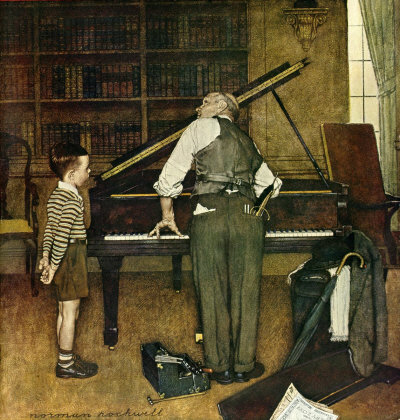"Many [piano tuners] play octaves using the thumb and the third finger since the little finger is not strong enough to withstand the repeated stress."
(http://www.best-norman-rockwell-art.com/1947-piano-tuner.html)
(http://www.best-norman-rockwell-art.com/1947-piano-tuner.html)
We grew up in a non-smoking household. None of my six family members smoked. No guests were allowed to smoke. But there was one visitor, who came no more than once a year, who was permitted to smoke: the piano tuner. My dad was picky about his piano and not just anyone could touch it.
I always knew when the piano tuner had visited. When I arrived home form school the doors and windows would be wide open and the living room would smell like smoke.
Piano tuners are a breed unto themselves. The piano tuner would arrive with a case full of tools. He would prop up the back of our antique grand piano, the first piece of furniture (even before a sofa) to fill my parents' living room as newlyweds over fifty-five years ago. He would light up a cigar, stick it in between his teeth, and start tapping on the ivory keys of our Mason & Risch.
A piano tuner's work is tedious; it can't be rushed. He pounds the notes over and over again until his fingers are numb. "Many [piano tuners] play octaves using the thumb and the third finger since the little finger is not strong enough to withstand the repeated stress." I suppose that's why the piano tuner smoked cigars rather than cigarettes. He knew he was in for a long day.
In Norman Rockwell's Piano Tuner, a little boy waits patiently, his hands folded behind his back, as a man tinkers at the keys of his piano. The man is completely absorbed in his work. He cocks his ear towards the piano, not wanting to miss a note. A coat, umbrella and towel rest on the piano bench. Light seeps through a nearby window. But the little boy does not go outside to play; he still waits until it his turn to sit at the piano once again.

No comments:
Post a Comment